Posted in Office Suites, Standard, OpenDocument, Europe, Open XML at 12:32 pm by Roy Schestowitz
Theo: http://boycottnovell.com/2008/06/05/slovakia-open-standards/
Bài được đưa lên Internet ngày: 05/06/2008
Lời người dịch: Với Slovakia thì các tệp DOC bị cấm sử dụng cho việc xuất bản các tài liệu, chỉ được phép để giao tiếp trong nội bộ các cơ quan chính phủ. Nghĩa là các tài liệu giao tiếp với người dân và doanh nghiệp không được phép sử dụng các tệp DOC, cũng không được phép sử dụng OOXML, chỉ được sử dụng ODF, PDF, RTF và HTML. Liệu Việt Nam chúng ta có nên học họ hay không?
Watch this space as we shall soon have an up-date
Đây là một phần từ cuộc nói chuyện IRC (mới được diễn ra chỉ vài phút trước đây). Chúng tôi có thể sớm có bản dịch bằng tay của thông tin này.
Toàn văn phần còn lại không được dịch, các bạn có thể xem tiếp bên dưới.
Here is a portion f-rom our IRC conversation (taking place just minutes ago). We might soon have a manual translation of this news.
In other uplifting news, watch this short story.
My lawyer made my day this morning. Not just because he does a great job, I’m used to that and that’s why he’s my lawyer. The reason he made my day today is because the document he just sent me is in ODF.
The intra-governmental aspect of this may spur the network effect. Slovakia has already shown it was fond of ODF some time in the past.
Up-date: Peter Kraus, adding his translator disclaimer, brings us the followiing translation of the news:
Which document formats will be used in communication with public administration?
After adoption of “National concept of informatization of public administration”, whe-re the current government set many bold time goals, the Ministry of Finances has, on Monday, submitted new draft handbill about used standards in public administration, with regards to communication with the public, businessmen and other subjects. The draft specifies all formats of documents, which the public service should be, compulsorily, able to accept.
(DSL.sk, 5th of July 2008)
On Monday has the Ministry of Finances of Slovak Republic submitted (on cross-resort discussion) new draft handbill of used standards, which should replace the current, valid one (f-rom Ministry of Post, Transport and Telecommunications #1706/M-2006, 14.6.2006)
The draft was submitted after approving of “National concept of informatization of public administration” in second half of may, about which we informed here.
The bill is more developed and detailed, in comparison with the currently valid one, and incorporates various principles f-rom aforementioned concept.
It differs a lot in prescribed standards in document formats, in many cases moved f-rom closed to open formats, and precisely specifies the duties of public administration. There are couple problematic points in the draft as well.
Text documents
The biggest attention is drawn to text document formats, which are, currently, the subject of international discussion about the conditions of formats and software in public administration; as well as source of problems of ISO and subject of EU commission investigation.
The Ministry developed the specification in depth. It requires the public administration to be able to receive text files in all specified formats. (The wording of currently valid bill binds the public administration to accept only one of proposed formats, the decision of the particular format is up to the body itself).
Documents can be published only in one format (true in both, the draft and valid bill).
The formats, surprisingly, included the Open Document Format, which was about to be removed f-rom the specification. In April, the Ministry said (for server DSL.sk), that ODF will be removed, because: “the main reason for change is, according to facts, the small spread of ODF.”
In the end of May, Microsoft announced, that Microsoft Office will support ISO approved ODF sooner, than ISO approved version of OpenXML.
The public administration will have to be able to receive text documents in formats: ODF, PDF 1.3, RTF and HTML.
Documents will be published in one of these formats, preferably PDF.
DOC format will be used in the exchange of text documents between the bodies of administration, but is forbidden for publishing.
Presentations, Pictures, other types
New issue are demands on format of presentation, whe-re the only one supported is Microsoft format, PowerPoint .ppt / .pps. Needless to say, that in case of presentations, the position of MS Office is much more stronger against the others, than in case of text/table documents.
Supported formats for table documents are missing f-rom the draft. Data are to be exchanged using XML; which is the only standard supported for electronic forms, but this is without further specification.
Raster images are supported in formats GIF, PNG, JPG, GeoTIFF and TIFF; Vector images in Shapefile, SVG and Flash. The same rules for receiving and publishing apply - the administration has to be able to receive the documents in any of the formats, and publish in one of them. The technical difficulties can arise in accepting vector images in Flash.
Audio and Video formats are specified by container formats - MPEG, OGG and MPEG-7; codec standards are MPEG-1, MPEG-2, MPEG-4, MP3 and XVID. This part looks incomplete, since XVID is usually transported in AVI containers, and there is lack of Theora/Vorbis support for OGG.
Streaming audio will be supported in format “H.261 and newer”. Supported archives will include ZIP, and new support for TAR and GZ.
Web pages, Emails
There are several rules for web pages as well.
If the page contains more than 100 different published web pages, keyword-search must be included.
RSS channel must be included for every page.
Text documents have to be, after publishing on the web, in HTML format (applies for documents which have to be published by the law, or other directives).
Standardized are email addresses as well. First part of email addresses for persons are “name.surname@”; generic addresses, such as “minister@” or “mayor@” are to be cre-ated as well.
Security, Other
The bill specifies deployment of IPv6 in new system components. It’s not clear, whether IPv6 must be supported in all new components, or not.
The security part was developed much more. It specifies rules of network and physical security, solves backups, and on theoretical level, protection against harmful code and software actualisations.
Backups are to be cre-ated weekly, for archivation one per two months in two copies. One archivation backup has to be stored in another (physical) place than the backuped information system.
Access control has to secure, that system administrators won’t have access to the data, which they won’t need for their duties - e.g. secret data in databases. According to our source f-rom IT in the public administration (which would like to remain anonymous) - this can be problematic.
Access of every user to the system has to be logged, and these logs can be changed only after approval f-rom responsible person.
Regular security checks are to be performed (at least one per year).
In comparison to the valid bill, this draft bill is less technically specific, mainly in cases of particular specification of used formats and standards. This can cause inconsistency in formats with more versions.
The bill can be commented on till 20.6., it should go into action 1.8.2008. Exceptions are applied to several points, which will take validity on 1.9.2009. Delayed will be support of PNG, XVID, OGG; also access control of administrators.
Dịch tài liệu: Lê Trung Nghĩa
Ý kiến bạn đọc
Những tin mới hơn
Những tin cũ hơn
Blog này được chuyển đổi từ http://blog.yahoo.com/letrungnghia trên Yahoo Blog sang sử dụng NukeViet sau khi Yahoo Blog đóng cửa tại Việt Nam ngày 17/01/2013.Kể từ ngày 07/02/2013, thông tin trên Blog được cập nhật tiếp tục trở lại với sự hỗ trợ kỹ thuật và đặt chỗ hosting của nhóm phát triển...
 DigComp 3.0: Khung năng lực số châu Âu
DigComp 3.0: Khung năng lực số châu Âu
 Các bài toàn văn trong năm 2025
Các bài toàn văn trong năm 2025
 Các bài trình chiếu trong năm 2025
Các bài trình chiếu trong năm 2025
 Các lớp tập huấn thực hành ‘Khai thác tài nguyên giáo dục mở’ tới hết năm 2025
Các lớp tập huấn thực hành ‘Khai thác tài nguyên giáo dục mở’ tới hết năm 2025
 Tập huấn thực hành ‘Khai thác tài nguyên giáo dục mở’ cho giáo viên phổ thông, bao gồm cả giáo viên tiểu học và mầm non tới hết năm 2025
Tập huấn thực hành ‘Khai thác tài nguyên giáo dục mở’ cho giáo viên phổ thông, bao gồm cả giáo viên tiểu học và mầm non tới hết năm 2025
 Các tài liệu dịch sang tiếng Việt tới hết năm 2025
Các tài liệu dịch sang tiếng Việt tới hết năm 2025
 Loạt bài về AI và AI Nguồn Mở: Công cụ AI; Dự án AI Nguồn Mở; LLM Nguồn Mở; Kỹ thuật lời nhắc;
Loạt bài về AI và AI Nguồn Mở: Công cụ AI; Dự án AI Nguồn Mở; LLM Nguồn Mở; Kỹ thuật lời nhắc;
 Tổng hợp các bài của Nhóm các Nhà cấp vốn Nghiên cứu Mở (ORFG) đã được dịch sang tiếng Việt
Tổng hợp các bài của Nhóm các Nhà cấp vốn Nghiên cứu Mở (ORFG) đã được dịch sang tiếng Việt
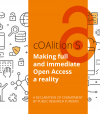 Tổng hợp các bài của Liên minh S (cOAlition S) đã được dịch sang tiếng Việt
Tổng hợp các bài của Liên minh S (cOAlition S) đã được dịch sang tiếng Việt
 Năm Khoa học Mở & Chuyển đổi sang Khoa học Mở - Tổng hợp các bài liên quan
Năm Khoa học Mở & Chuyển đổi sang Khoa học Mở - Tổng hợp các bài liên quan
 Bàn về 'Lợi thế của doanh nghiệp Việt là dữ liệu Việt, bài toán Việt' - bài phát biểu của Bộ trưởng Nguyễn Mạnh Hùng ngày 21/08/2025
Bàn về 'Lợi thế của doanh nghiệp Việt là dữ liệu Việt, bài toán Việt' - bài phát biểu của Bộ trưởng Nguyễn Mạnh Hùng ngày 21/08/2025
 Bạn cần biết những gì về các khung năng lực AI mới của UNESCO cho học sinh và giáo viên
Bạn cần biết những gì về các khung năng lực AI mới của UNESCO cho học sinh và giáo viên
 Khung năng lực AI cho giáo viên
Khung năng lực AI cho giáo viên
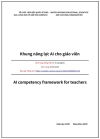 ‘Khung năng lực AI cho giáo viên’ - bản dịch sang tiếng Việt
‘Khung năng lực AI cho giáo viên’ - bản dịch sang tiếng Việt
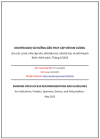 ‘KHUYẾN NGHỊ VÀ HƯỚNG DẪN TRUY CẬP MỞ KIM CƯƠNG cho các cơ sở, nhà cấp vốn, nhà bảo trợ, nhà tài trợ, và nhà hoạch định chính sách’ - bản dịch sang tiếng Việt
‘KHUYẾN NGHỊ VÀ HƯỚNG DẪN TRUY CẬP MỞ KIM CƯƠNG cho các cơ sở, nhà cấp vốn, nhà bảo trợ, nhà tài trợ, và nhà hoạch định chính sách’ - bản dịch sang tiếng Việt
 50 công cụ AI tốt nhất cho năm 2025 (Đã thử và kiểm nghiệm)
50 công cụ AI tốt nhất cho năm 2025 (Đã thử và kiểm nghiệm)
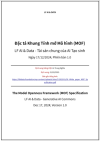 ‘Đặc tả Khung Tính mở Mô hình (MOF)’ của LF AI & Data - Tài sản chung của AI Tạo sinh - bản dịch sang tiếng Việt
‘Đặc tả Khung Tính mở Mô hình (MOF)’ của LF AI & Data - Tài sản chung của AI Tạo sinh - bản dịch sang tiếng Việt
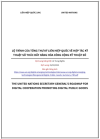 ‘LỘ TRÌNH CỦA TỔNG THƯ KÝ LIÊN HIỆP QUỐC VỀ HỢP TÁC KỸ THUẬT SỐ THÚC ĐẨY HÀNG HÓA CÔNG CỘNG KỸ THUẬT SỐ’ - bản dịch sang tiếng Việt
‘LỘ TRÌNH CỦA TỔNG THƯ KÝ LIÊN HIỆP QUỐC VỀ HỢP TÁC KỸ THUẬT SỐ THÚC ĐẨY HÀNG HÓA CÔNG CỘNG KỸ THUẬT SỐ’ - bản dịch sang tiếng Việt
 AI trong TVET - Một vài gợi ý triển khai trong thực tế
AI trong TVET - Một vài gợi ý triển khai trong thực tế
 Dữ liệu để phân loại AI
Dữ liệu để phân loại AI
 Khung năng lực AI cho học sinh
Khung năng lực AI cho học sinh
 Tài sản chung kỹ thuật số và Hàng hóa Công cộng Kỹ thuật số - Tìm thấy nền tảng chung cho các nhà hoạch định chính sách
Tài sản chung kỹ thuật số và Hàng hóa Công cộng Kỹ thuật số - Tìm thấy nền tảng chung cho các nhà hoạch định chính sách
 Tọa đàm ‘Vai trò của Tài nguyên Giáo dục Mở trong chuyển đổi số giáo dục đại học’ tại Viện Chuyển đổi số và Học liệu - Đại học Huế, ngày 12/09/2025
Tọa đàm ‘Vai trò của Tài nguyên Giáo dục Mở trong chuyển đổi số giáo dục đại học’ tại Viện Chuyển đổi số và Học liệu - Đại học Huế, ngày 12/09/2025
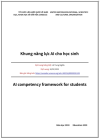 ‘Khung năng lực AI cho học sinh’ - bản dịch sang tiếng Việt
‘Khung năng lực AI cho học sinh’ - bản dịch sang tiếng Việt
 12 dự án AI Nguồn Mở hàng đầu để bổ sung vào kho công nghệ của bạn. 11. Hugging Face Transformers
12 dự án AI Nguồn Mở hàng đầu để bổ sung vào kho công nghệ của bạn. 11. Hugging Face Transformers
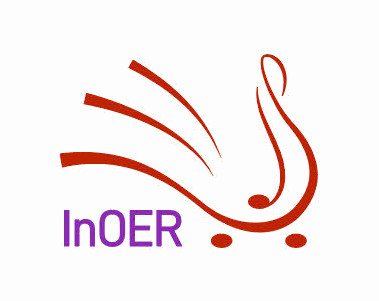 Dự án DIAMAS đưa ra Khuyến nghị và Hướng dẫn Truy cập Mở Kim cương
Dự án DIAMAS đưa ra Khuyến nghị và Hướng dẫn Truy cập Mở Kim cương
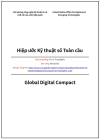 ‘Hiệp ước Kỹ thuật số Toàn cầu’ của Liên hiệp quốc - bản dịch sang tiếng Việt
‘Hiệp ước Kỹ thuật số Toàn cầu’ của Liên hiệp quốc - bản dịch sang tiếng Việt
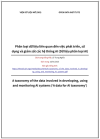 ‘Phân loại dữ liệu liên quan đến việc phát triển, sử dụng và giám sát các hệ thống AI (Dữ liệu phân loại AI)’ - bản dịch sang tiếng Việt
‘Phân loại dữ liệu liên quan đến việc phát triển, sử dụng và giám sát các hệ thống AI (Dữ liệu phân loại AI)’ - bản dịch sang tiếng Việt
 50 công cụ AI tốt nhất cho năm 2025 (Đã thử và kiểm nghiệm) - Trợ lý AI tốt nhất (chatbots)
50 công cụ AI tốt nhất cho năm 2025 (Đã thử và kiểm nghiệm) - Trợ lý AI tốt nhất (chatbots)
 Hướng dẫn kỹ thuật lời nhắc. Kỹ thuật viết lời nhắc. Lời nhắc Tái Hành động (ReAct)
Hướng dẫn kỹ thuật lời nhắc. Kỹ thuật viết lời nhắc. Lời nhắc Tái Hành động (ReAct)